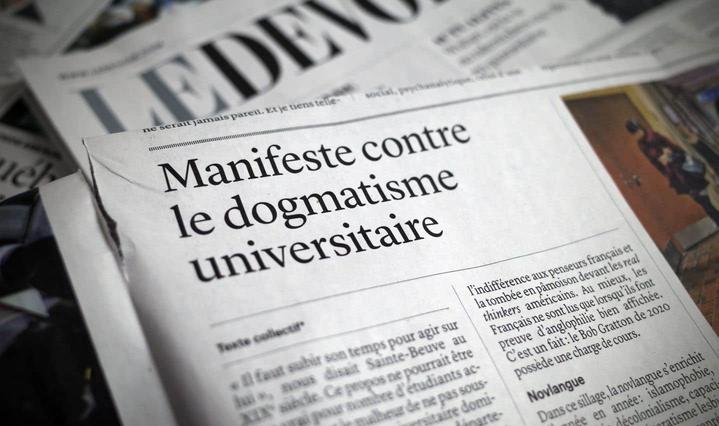In response to the "Manifesto against university dogma" Get the latest alerts from Le Devoir
A group of students wrote a manifesto, published on January 30, in which they oppose what they call “university dogmatism”. Also members of the university community, we believe that the argument presented by this group is problematic in several respects. We therefore propose a critical response to a text that amalgamates undefined concepts and ideological assertions, manifestly with the idea of discrediting the social sciences and “the progressive left”.
Reducing the social sciences to an ideology seems to us to deny the rigorous character of the designated disciplines. Moreover, the representation of these disciplines as being “colonized” by “Anglophile” tendencies is fallacious in itself: French authors occupy an important place in the lesson plans, as well as, let us recall, white men. Thus, labeling social science teachers as "intersectionality enthusiasts" seems entirely out of place to us, given that critical epistemologies and theories take up little, if any, place in undergraduate courses and even in seminars — not to mention the theories produced by women or people of color. The authors of the letter therefore claim to be standing against the tide of a left-wing hegemony which would have the monopoly of the university institution, whereas in fact this assertion does not hold water.
The excerpt taking up the Orwellian concept of newspeak testifies for its part to a backlash effect towards minority communities who gain rights and representativity from pain and misery. The words that the authors of the letter ridicule, such as "Islamophobia", "transphobia" or even "ableism", are part of an initiative to update the theoretical language necessary for the development of the fields of study that they also lament. Indeed, according to their text, the departments of feminist studies, awareness of the different forms of racism and recognition of the violent colonialism suffered by members of the First Nations, Inuit and Métis would be problems.
Let us recall in passing that the letter was published the day after the third anniversary of the attack on the Quebec mosque, an event whose very occurrence was permitted by our collective denial of Islamophobia, and whose commemoration remains clearly insufficient. . Recognizing these types of discrimination by naming them is a necessary first step in avoiding the perpetration of violent acts such as this.
How to diagnose and treat combined HCC-CCA? 💉🔬☢️💊 How can AI be helpful? 💻🧠 ☑️ Find it out at #IL2021 workshop on… https://t.co/EuRRZhdJs6
— Marco Sanduzzi Zamparelli Sat Jun 05 19:44:17 +0000 2021

We also believe that orienting the question of oppression around the Canada-Quebec relationship testifies to a narrow vision of power relations, but also to the elasticity of the concept of oppression, characteristics of the Quebec identity malaise. Designating Quebecers as victims of subordination to the Canadian state obscures the fact that in 2020, our role is much more that of the oppressor, both towards Indigenous communities and people from the immigration only towards Afro-descendants. Moreover, putting all oppressions on the same equal footing demonstrates a reductive conception of what they really are, that is to say plural, situated in time and space, inseparable from their context and having infinitely varied impacts. It therefore seems important to us to remember that the Canada-Quebec relationship is incomparable to the power relations that the Euro-descending white hegemony exercises over those it colonizes and marginalizes.
The argument mobilized regarding freedom of expression, inherited from speeches in right-wing and far-right American circles, suggests that supporters of conservatism are increasingly restricted in their freedom of expression on university campuses. In the United States, Professor Keeanga-Yamahtta Taylor of Princeton University observes that pro-free speech rhetoric such as that employed by the authors of this letter often backfires on students and left-wing activist professors. This is what leads Taylor and other authors to speak of a "hypocrisy of freedom of expression": in other words, it is defended body and soul when it comes to spreading the speeches conservatives who are considered to be under threat, but the same right does not seem to apply to left-wing activists.
The signatories of the "Manifesto against university dogmatism" therefore subscribe to a reactionary rhetoric which gives itself revolutionary airs and, to do this, proclaim themselves the heirs of the authors of the Refus global manifesto, tearing this text out of its context. sociohistorical and associating it with a phantom struggle that has no connection with what they and they claimed. This overt proposal for a backlash confirms the usefulness of the struggles of marginalized groups for representation, weight, importance in the neoliberal education system.
*This text is signed by more than 280 people from various CEGEPs and universities.










10 Ways to Stay Safe When You Live Alone
Will Belgian workers quit?
Hotels, restaurants: tips paid by credit card will soon be tax-exempt
How to draw a rose: our methods